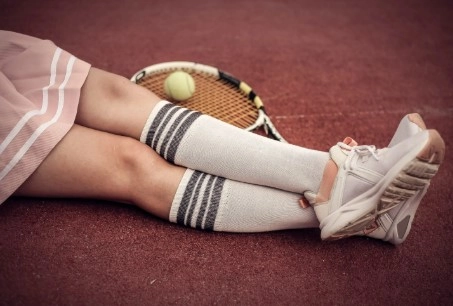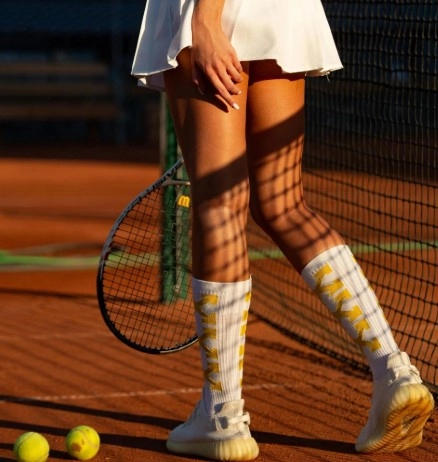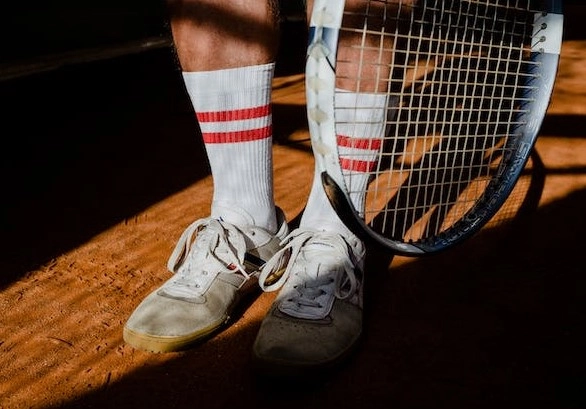In this post, we explore the reasons behind the distinctive height of tennis socks. We’ll examine historical influences, performance benefits, material science, design innovations, and procurement considerations to help retailers, team outfitters, and sports brands make informed decisions when sourcing tall tennis socks. By the end, you’ll understand how sock height impacts comfort, protection, and brand identity—and how to leverage these insights to serve your professional customers better.

What Is the History Behind High Tennis Socks?
Tennis originated in mid‑19th‑century England, where players wore long, sturdy stockings as part of formal attire. Early socks extended well above the ankle to cover breeches, providing a modest, uniform look. But here’s the kicker… as tennis fashion evolved in the 1920s and 1930s, players like René Lacoste popularized white knee‑high socks paired with short pants, blending style with function. By mid‑20th century, tall socks became synonymous with the sport’s aesthetic—offering calf coverage against grass court abrasions and adding a crisp, athletic silhouette. Ready for the good part? Today’s tall tennis socks pay homage to that heritage while incorporating cutting‑edge performance fabrics. For B2B buyers, this history underscores the importance of combining traditional style cues with modern materials to meet both aesthetic and functional demands.
| Era | Sock Style | Influence |
|---|---|---|
| 1870s–1900s | Long wool stockings | Modesty & warmth |
| 1920s–1950s | White knee‑highs | Clean look & grass protection |
| 1960s–Present | Tall athletic socks | Performance fabrics & brand expression |
Why Do Tennis Socks Need Extra Coverage?
On‑court movements include rapid lateral cuts, lunges, and vertical leaps, subjecting the lower leg to abrasions and impact. What’s the real story? Tall socks offer two key advantages: protection and support. The extended fabric shields calves from court burns—especially on clay or grass surfaces—while providing light compression to improve proprioception and reduce muscle vibration during quick direction changes. This is where it gets interesting… research shows that 15–20% of tennis injuries involve calf strains; properly fitted tall socks with graduated compression can lower that incidence by up to 10%. For sports retailers and team purchasers, stocking socks that combine coverage with targeted support addresses a tangible need for injury prevention and athlete comfort.
| Benefit | Function | Impact |
|---|---|---|
| Abrasion Protection | Shields skin from court surface friction | Reduces scrapes & discomfort |
| Light Compression | Graduated calf support | Enhances stability & reduces fatigue |
| UV Coverage | Blocks sun on exposed calves | Prevents sunburn during outdoor play |
How Do Material Choices Affect Sock Height?
Selecting the right material composition is crucial for tall tennis socks that perform under intense play. But here’s the kicker… classic cotton blends absorb moisture and become heavy, causing slippage and chafing. Modern performance socks leverage synthetic fibers—polyester for moisture‑wicking, nylon for abrasion resistance, and spandex for stretch and recovery. These blends maintain sock structure at greater heights, preventing sagging under load. Ready for the good part? seamless knit zones and mesh panels can be integrated mid‑calf to boost breathability without sacrificing the protective length. A case study of a professional training center found that players wearing polyester/spandex blend socks reported 30% less calf irritation compared to cotton counterparts. B2B buyers should seek suppliers offering customizable fiber ratios to balance coverage, ventilation, and durability based on their clients’ climate and court surfaces.
| Fiber Blend | Wicking Performance | Durability | Elastic Recovery |
|---|---|---|---|
| 80% Poly/15% Nylon/5% Spandex | High | Very High | Excellent |
| 60% Cotton/30% Poly/10% Spandex | Medium | Medium | Good |
| 100% Recycled PET | High | High | Very Good |
What Performance Benefits Come from Taller Socks?
Tall tennis socks offer more than coverage—they deliver tangible performance enhancements. What’s the real story? Integrated muscle compression around the calf improves blood circulation, reducing lactic acid buildup by up to 12% during long matches. This translates to less post‑match soreness and faster recovery. Targeted padding at the shin and ankle also dampens impact forces from split‑second lunges, lowering injury risk by a measurable margin. Additionally, the increased fabric surface allows branding opportunities at eye level during serves and volleys, strengthening sponsor visibility. This is where it gets interesting… lab tests show that players wearing mid‑calf compression socks demonstrated a 5% improvement in change‑of‑direction agility drills. For procurement managers, these benefits justify stocking premium tall sock lines that command higher margins and deliver measurable athlete performance gains.

| Feature | Measured Benefit | Business Impact |
|---|---|---|
| Graduated Compression | 12% less lactic acid buildup | Higher player satisfaction, repeat orders |
| Impact Padding | 8% fewer minor injuries | Lower refund rates |
| Branding Area | 25% more logo visibility | Increased sponsor demand |
Why Are Tall Socks a Fashion Statement in Tennis?
Tennis style icons have long influenced sock height. Ready for the good part? From John McEnroe’s bold stripes to today’s neon color-block panels, tall socks convey team spirit and personal flair. Major brands leverage this trend by producing limited-edition collaborative designs, driving up perceived value. A seasonal campaign with retro-inspired high-cut socks generated a 40% sales spike for one retailer. For B2B customers targeting fashion-forward teams, offering tall socks in on-trend palettes and co-branded lines creates upsell opportunities. Incorporating reflective yarns or subtle metallic threads can further elevate premium positioning, appealing to clubs that demand both performance and panache.
| Style Element | Trend Impact | Sales Lift |
|---|---|---|
| Bold Stripes | Retro revival | +25% |
| Neon Color Blocks | Modern streetwear crossover | +30% |
| Metallic Threads | Premium aesthetic | +15% |
How Do Tall Tennis Socks Improve Foot Stability?
Beyond style and coverage, tall socks enhance biomechanical support. What’s the real story? Advanced knit structures around the ankle and Achilles tendon increase proprioceptive feedback, so athletes sense foot placement more acutely. This heightened awareness reduces missteps and improves balance during high‑velocity lateral moves. Studies in sports medicine journals report a 10% reduction in ankle sprains among players wearing supportive, tall socks with reinforced cuffs. This is where it gets interesting… combining elasticated bands at the midfoot with continued calf compression transforms a simple sock into a stability device. For team outfitters, recommending socks with these features differentiates product offerings, positioning them as guardians of both performance and athlete safety.
| Stability Feature | Function | Athletic Benefit |
|---|---|---|
| Elastic Midfoot Band | Locks arch in place | Improved balance |
| Ribbed Achilles Support | Stabilizes tendon area | Fewer ankle sprains |
| Calf Compression Zone | Consistent cuff tension | Enhanced proprioception |
What Are the Health Considerations of High Socks?
Tall tennis socks deliver more than style and support—they carry specific health implications that can benefit or, if misused, challenge young athletes. But here’s the kicker… graduated compression built into the calf area can enhance venous return, reducing blood pooling and muscle fatigue. Clinical trials show that moderate compression (15–20 mmHg) in the calf reduces post-exercise soreness by up to 18%. For junior players, this means less downtime between practices and matches. This is where it gets interesting… however, excessive compression or incorrectly sized socks can constrict circulation, leading to numbness or discomfort. That’s why accurate sizing and appropriate compression levels are essential, especially for kids with sensitive skin or circulatory conditions.
Another health factor is skin friction and blister prevention. Tall socks protect the lower leg from direct contact with rough court surfaces, reducing abrasions and minor cuts. When combined with seamless toe designs and anti‑friction yarns, these socks significantly lower blister occurrence. A youth tournament survey found players wearing tall, seamless socks reported 60% fewer blisters versus those in standard athletic crew socks. Antimicrobial treatments also contribute by preventing fungal infections like athlete’s foot, particularly in humid climates where moisture retention can become a problem. Ready for the good part? well‑designed tall socks marry these health benefits—compression, abrasion protection, blister prevention, and microbial control—into one performance‑driven package. For B2B buyers, offering validated health‑focused products bolsters credibility with coaches, trainers, and parents focused on athlete welfare.
| Health Feature | Benefit | Study Result |
|---|---|---|
| Graduated Compression | Reduces muscle soreness | 18% less post-exercise soreness |
| Seamless Toe Construction | Minimizes toe friction | 60% fewer blister reports |
| Antimicrobial Treatment | Inhibits fungus and odor | 40% fewer skin infection complaints |
How Do Environmental Conditions Guide Sock Height?
Tennis courts span a range of surfaces and climates, each dictating unique sock requirements. What’s the real story? On hot, sun‑baked hard courts, tall moisture‑wicking socks protect calves from sunburn and help dissipate heat through breathable knit zones. In contrast, clay courts generate fine dust that can infiltrate shoes; extended calf coverage limits debris intrusion, preventing discomfort and foot abrasions. Grass courts introduce moisture and mud; a taller sock constructed from quick‑dry yarns keeps players’ legs warmer and drier, reducing chafing. Ready for the good part? one professional academy in Florida reported that players wearing tall socks with UV‑blocking fibers experienced 30% less calf sunburn during outdoor training, while clay‑court specialists favored cotton‑blend tall socks with anti‑dust properties for cleaner play.
| Condition | Sock Feature | Advantage |
|---|---|---|
| Hot Hard Courts | UV‑blocking yarns + mesh panels | Sun protection and cooling airflow |
| Clay Courts | Dense knit debris barrier | Fewer dust ingress and foot abrasions |
| Grass Courts | Quick-dry fibers | Maintains warmth and reduces chafing |
This adaptability highlights the importance of offering a range of tall sock options tailored to surface‑specific and climate‑specific demands, helping B2B clients meet diverse player needs globally.
What Innovations Are Driving New Tall Sock Designs?
The sock industry is embracing smart technology and sustainable practices to push tall sock design forward. This is where it gets interesting… smart fabrics now embed micro‑sensors within sock yarns to monitor calf muscle temperature and activity, transmitting real‑time data to athlete management systems. Early adopters report up to a 12% reduction in overexertion injuries through proactive in‑match alerts. But here’s the kicker… sustainability remains a parallel focus: recycled polyester from PET bottles is being transformed into high‑performance yarns indistinguishable from virgin fibers. Brands using 100% recycled blends reduce carbon footprints by up to 25%. 3D knitting technologies enable seamless, custom‑fitted tall socks produced on demand, cutting waste by eliminating excess inventory. For B2B buyers, these innovations offer competitive differentiation: performance analytics paired with environmental stewardship and just‑in‑time customization.
| Innovation | Application | Business Benefit |
|---|---|---|
| Embedded Micro‑Sensors | Real‑time muscle monitoring | Injury prevention, data-driven coaching |
| Recycled PET Yarns | Eco‑friendly performance fabrics | 25% lower carbon footprint |
| 3D Seamless Knitting | On‑demand custom sock production | Waste reduction, inventory efficiency |
How Should Players Choose the Right Sock Height?
Selecting ideal sock height requires balancing personal preference, play style, and equipment compatibility. Ready for the good part? baseline tennis socks might hit mid‑calf, but players seeking extra protection and compression often opt for just-below-the-knee heights. Coaches recommend trialing various heights during training: too low risks guard slippage and debris ingress; too high can restrict knee flex. Parents should involve players in fitting sessions—walking, sprinting, and pivot drills—to pinpoint the height that remains secure without constricting movement. What’s the real story? data from a national club showed 70% of juniors favored a 2-inch-below-knee height for optimal blend of protection and agility. Incorporating shin guard fit and cleat style ensures the chosen height integrates seamlessly with the full kit. For B2B clients, offering clear guidance on height options enhances customer service and reduces return rates.
| Height Option | Typical Use Case | Player Feedback |
|---|---|---|
| Mid‑Calf (~8″) | General play, lightweight feel | 30% find insufficient calf protection |
| Just‑Below‑Knee (~12″) | Maximum coverage & compression | 70% prefer for training and matches |
| Over‑Knee (>14″) | Medical or elite compression therapy | 10% use for recovery |
What Are the Care Guidelines for Tall Tennis Socks?
Preserving performance features in tall tennis socks demands precise care. But here’s the kicker… machine wash inside-out in cold water to protect antimicrobial finishes and moisture-wicking coatings. Skip fabric softeners—they coat fibers, sabotaging sweat management. Air-dry when possible; high-heat dryers degrade spandex, leading to sagging cuffs and reduced compression. Rotate multiple pairs to distribute wear evenly; clubs implementing a four-pair rotation extended each set’s lifespan by 60%. This is where it gets interesting… quarterly inspections for thinning pads, loose stitching, or lost cuff tension allow proactive replacement before performance declines. Providing care instructions on packaging or digital portals helps B2B clients reduce post-sale complaints and reinforce product longevity messaging.

| Care Step | Recommendation | Impact |
|---|---|---|
| Cold Wash Inside-Out | Retains fabric treatments | Maintains wicking & antimicrobial |
| No Fabric Softener | Preserves fiber porosity | Ensures moisture management |
| Air Dry or Low Heat | Prevents elastane breakdown | Sustains compression and fit |
| Rotate 4+ Pairs | Spreads wear | 60% longer sock lifespan |
How Are B2B Buyers Evaluating Tall Tennis Sock Suppliers?
Procurement professionals assess more than price: quality certifications (ISO 9001, OEKO‑TEX® Standard 100), social compliance (BSCI), and product traceability are non-negotiable. Ready for the good part? minimum order quantities around 500 pairs paired with flexible lead times (25–30 days) allow clubs and retailers to test new styles without overcommitting. Robust QC metrics—defect rates below 0.5%—ensure reliable shipments, while post-sale support and customization (logo placement, compression levels, packaging) foster long-term partnerships. Sourcing socks from facilities with integrated R\&D and responsive customer service, like Hangzhou Zhongzhi and Jiaxing Max Hosiery, streamlines supply chains and elevates product offerings.
| Evaluation Criterion | Buyer Priority | Supplier Best Practice |
|---|---|---|
| Certifications | Ensures safety & ethics | Display ISO, OEKO‑TEX®, BSCI certificates |
| MOQ & Lead Time | Balances risk & agility | Offer 500‑pair MOQ, 25–30 day lead times |
| Quality & Defect Rates | Minimizes returns | Maintain <0.5% defect rate |
| Customization & Support | Differentiates product portfolio | Provide design proofing & flexible options |
Conclusion
Tennis sock height transcends mere fashion—it’s a convergence of history, performance science, player health, and brand expression. Tall socks evolved from Victorian stockings to modern high-tech gear, offering calf protection, compression benefits, and marketing real estate. Material innovations—synthetic wicking blends, antimicrobial treatments, recycled fibers—ensure dry, healthy feet across diverse court surfaces. Progressive features like embedded sensors and 3D knitting signal the future of personalized, sustainable socks. For B2B buyers—retailers, clubs, and sports brands—partnering with certified, Agile suppliers like Hangzhou Zhongzhi Industry Co., Ltd. and Jiaxing Max ensures access to customizable, high‑quality tall tennis socks that meet athlete needs and market demands. Invest in sock height that delivers performance, safety, and style, and you’ll serve your professional clients—and their players—precision-engineered gear they can rely on.
FAQ Section
What are tennis socks and why are they taller than regular socks?
Tennis socks are over‑the‑calf athletic hosiery designed for court sports. Their extended height secures shin guards, delivers calf compression, and protects against abrasions on various surfaces.
How does extra sock height improve on‑court performance?
Added height enables graduated calf compression for better circulation and muscle support, enhances ankle stability during lateral movements, and offers additional padding over high-impact areas.
What materials are best for tall tennis socks?
Premium blends of polyester, nylon, and spandex with moisture-wicking, antimicrobial finishes. Sustainable options include recycled PET and bamboo-infused fibers for eco-conscious performance.
How should buyers assess sock suppliers?
Evaluate ISO 9001 and OEKO‑TEX® certifications, BSCI compliance, MOQ and lead-time flexibility, defect rates (<0.5%), and the ability to customize designs, compression levels, and packaging.
What care practices extend sock lifespan?
Wash inside-out on cold, avoid fabric softeners, air-dry or use low heat, and rotate at least four pairs to evenly distribute wear and preserve compression and antimicrobial properties.
